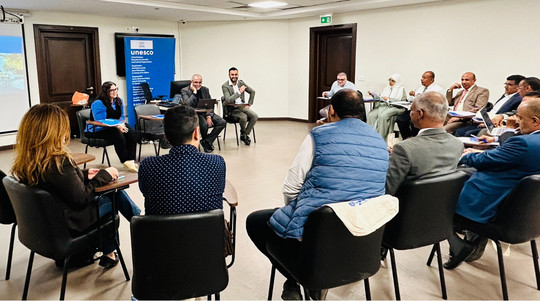Yemeni journalists reporting on the ground face a climate of danger, which could entail enduring intimidation, physical threats and, on certain occasions, deprivation of freedom, according to the latest Yemeni Journalists’ Syndicate (YJS) media freedom report. In this context, the adoption of the Model course on safety of journalists: a guide for journalism teachers in the Arab States by two Yemeni universities is a significant victory in a country, where being a journalist can cost one’s life.
Following the organisation of a training on the Model Course on Safety of Journalists by UNESCO and IFJ in December 2023 in Cairo, both organisations were informed in September that the University of Saba Region, and the University of Al Mahra had integrated the Media Safety Curriculum into its journalism studies’ education programme at the start of the 2024-2025 academic year.
The meeting organised in December, was attended by the heads of departments and media professors from eight Yemeni Universities. During the session, the organisations presented the curriculum and provided experiences and best practices on how this course is being implemented in other universities in the region.
M. Salah Khaled, Director of the UNESCO office to the Gulf States and Yemen explained: “The Model Course on Safety of Journalists for the Arab States aims at equipping journalism students with the skills and knowledge to better protect themselves while operating in disaster situation and conflict zone, and understand the global legal framework established by international law. The adoption of this course within the curriculum of the University of Saba region in Marib governorate and the University of Al Mahra is a great achievement and we would like to warmly congratulate those two universities. UNESCO reiterates its support to Yemeni Universities and hopes that more institutions will be adopting the course within their curriculum.
IFJ General Secretary Anthony Bellanger said: “Academic institutions that offer journalism studies play a critical role in raising awareness of the risks faced by journalists and media workers in the course of their work. Moreover, they should provide students with the appropriate tools to operate safely when reporting on the ground, because no story is worth the life of a journalist. We congratulate the University of Saba Region in Marib Governorate for this significant step and hope that other Yemeni academic institutions will follow suit for the sake of its journalism students. Besides, I would like to take this opportunity to recognise the valuable contribution of the Norwegian Union of Journalists, without whom it would have been impossible to develop the Media Safety Curriculum and promote it since 2015, including the organisation of the workshop in Cairo in 2023”.
Developed by the IFJ and UNESCO, with the support of the Multi Donor Programme on Freedom of Expression and Safety of Journalists (MDP), the course involved consultations with universities and journalism schools from across the region. It combines theoretical and practical knowledge and skills aimed at enhancing the safety of journalists, and helping academic institutions fulfil their responsibilities under the UN Plan of Action on the Safety of Journalists and the Issue of Impunity. Among the subjects covered by the curriculum are planning for personal safety, personal health care and trauma in hostile environments, risk assessment, gender and safe reporting, and human rights, among others.

